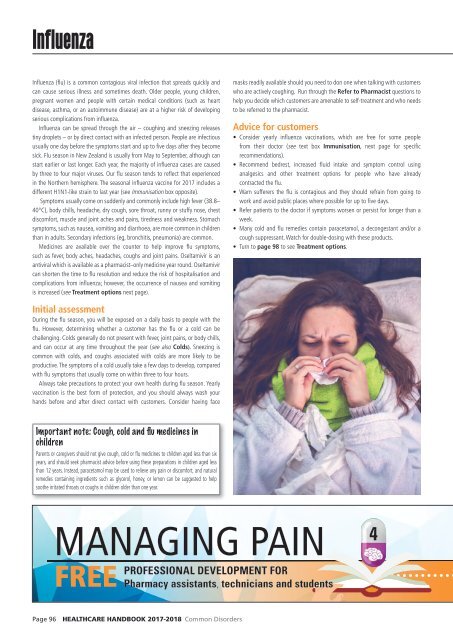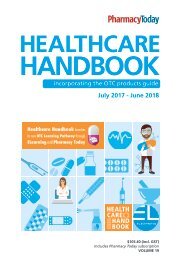2017 HCHB_digital
You also want an ePaper? Increase the reach of your titles
YUMPU automatically turns print PDFs into web optimized ePapers that Google loves.
Influenza<br />
Influenza (flu) is a common contagious viral infection that spreads quickly and<br />
can cause serious illness and sometimes death. Older people, young children,<br />
pregnant women and people with certain medical conditions (such as heart<br />
disease, asthma, or an autoimmune disease) are at a higher risk of developing<br />
serious complications from influenza.<br />
Influenza can be spread through the air – coughing and sneezing releases<br />
tiny droplets – or by direct contact with an infected person. People are infectious<br />
usually one day before the symptoms start and up to five days after they become<br />
sick. Flu season in New Zealand is usually from May to September, although can<br />
start earlier or last longer. Each year, the majority of influenza cases are caused<br />
by three to four major viruses. Our flu season tends to reflect that experienced<br />
in the Northern hemisphere. The seasonal influenza vaccine for <strong>2017</strong> includes a<br />
different H1N1-like strain to last year (see Immunisation box opposite).<br />
Symptoms usually come on suddenly and commonly include high fever (38.8–<br />
40°C), body chills, headache, dry cough, sore throat, runny or stuffy nose, chest<br />
discomfort, muscle and joint aches and pains, tiredness and weakness. Stomach<br />
symptoms, such as nausea, vomiting and diarrhoea, are more common in children<br />
than in adults. Secondary infections (eg, bronchitis, pneumonia) are common.<br />
Medicines are available over the counter to help improve flu symptoms,<br />
such as fever, body aches, headaches, coughs and joint pains. Oseltamivir is an<br />
antiviral which is available as a pharmacist–only medicine year round. Oseltamivir<br />
can shorten the time to flu resolution and reduce the risk of hospitalisation and<br />
complications from influenza; however, the occurrence of nausea and vomiting<br />
is increased (see Treatment options next page).<br />
masks readily available should you need to don one when talking with customers<br />
who are actively coughing. Run through the Refer to Pharmacist questions to<br />
help you decide which customers are amenable to self-treatment and who needs<br />
to be referred to the pharmacist.<br />
Advice for customers<br />
• Consider yearly influenza vaccinations, which are free for some people<br />
from their doctor (see text box Immunisation, next page for specific<br />
recommendations).<br />
• Recommend bedrest, increased fluid intake and symptom control using<br />
analgesics and other treatment options for people who have already<br />
contracted the flu.<br />
• Warn sufferers the flu is contagious and they should refrain from going to<br />
work and avoid public places where possible for up to five days.<br />
• Refer patients to the doctor if symptoms worsen or persist for longer than a<br />
week.<br />
• Many cold and flu remedies contain paracetamol, a decongestant and/or a<br />
cough suppressant. Watch for double-dosing with these products.<br />
• Turn to page 98 to see Treatment options.<br />
Initial assessment<br />
During the flu season, you will be exposed on a daily basis to people with the<br />
flu. However, determining whether a customer has the flu or a cold can be<br />
challenging. Colds generally do not present with fever, joint pains, or body chills,<br />
and can occur at any time throughout the year (see also Colds). Sneezing is<br />
common with colds, and coughs associated with colds are more likely to be<br />
productive. The symptoms of a cold usually take a few days to develop, compared<br />
with flu symptoms that usually come on within three to four hours.<br />
Always take precautions to protect your own health during flu season. Yearly<br />
vaccination is the best form of protection, and you should always wash your<br />
hands before and after direct contact with customers. Consider having face<br />
Important note: Cough, cold and flu medicines in<br />
children<br />
Parents or caregivers should not give cough, cold or flu medicines to children aged less than six<br />
years, and should seek pharmacist advice before using these preparations in children aged less<br />
than 12 years. Instead, paracetamol may be used to relieve any pain or discomfort, and natural<br />
remedies containing ingredients such as glycerol, honey, or lemon can be suggested to help<br />
soothe irritated throats or coughs in children older than one year.<br />
MANAGING PAIN<br />
FREE<br />
PROFESSIONAL DEVELOPMENT FOR<br />
Pharmacy assistants, technicians and students<br />
4<br />
Page 96 HEALTHCARE HANDBOOK <strong>2017</strong>-2018 Common Disorders



